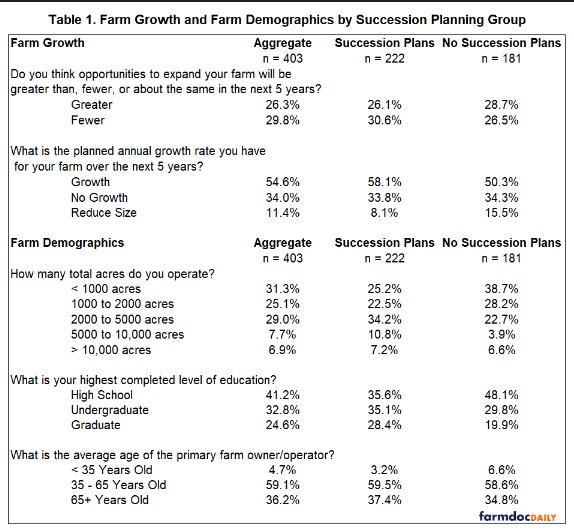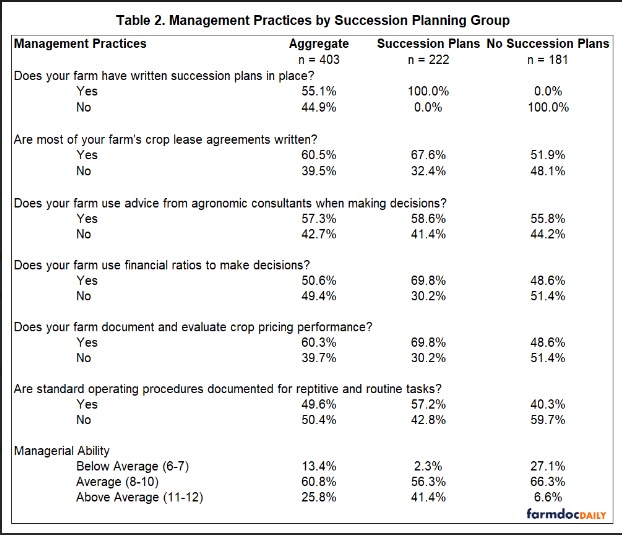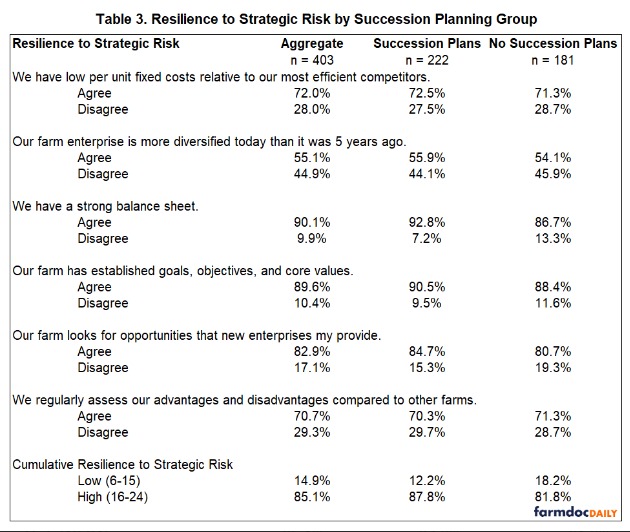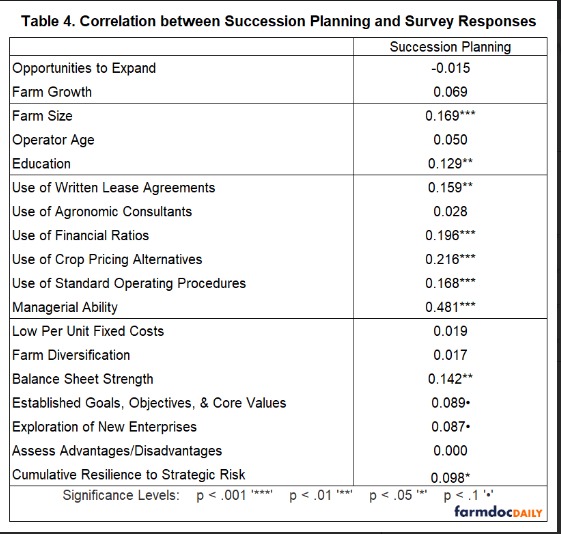By Michael Langemeier and James Mintert et.al
Introduction
Succession plans ensure continuation of the farm business. Without succession plans, the next generation is left in limbo, unsure of how to split the farm, and may be forced to sell because an agreement can’t be reached. Guilt often overcomes those who would like to continue farming, but are unable to follow in the footsteps of preceding generations. While an entitled mentality may drive other family members to make it difficult or impossible for the family farm business to continue operating. These disagreements can drive families apart, leaving all involved with soured opinions of relatives they have known their whole lives.
A solution to this is well within reach. If time is devoted to creating succession plans and review is done regularly, farms can continue doing what they do best without these looming uncertainties. This article explores key factors associated with farms which have developed written succession plans. Specifically, we examine the relationship between written succession plans and farm characteristics such as farm growth, farm demographics, management practices, and resilience to strategic risk. Results presented and discussed in this article were derived from a survey of 403 U.S. producers conducted in April 2023. An earlier article used survey results to discuss resilience to strategic risk (Lippsmeyer et al., 2023). With this article we hope to encourage farms to create or review their succession plans.
Why Does Your Farm Need Succession Plans?
According to the 2017 USDA Census, slightly over half of U.S. farms (56%) are involved in any sort of succession planning (United States Department of Agriculture, 2019). Lack of planning may be due to a variety of factors including unwillingness to engage in difficult conversations, complications in personal lives, inability to identify a competent heir, insufficient resources to support more family members depending on the farm, or current operators not wanting to force family members back to the farm (Kaplan et al., 2009). Results from our survey show similar results with 55% of farms having written succession plans.
Succession planning, or the lack thereof, has major implications for the legacy of family farms across the U.S. and transfer of farming knowledge from one generation to the next. By creating succession plans, farms ensure stable transition to the next generation and allow the current operator to work alongside new operators. This improves the transfer of knowledge and management strategy, helping new farm operators make better informed decisions and avoid productivity declines (Hicks et al., 2012). Prior research also indicates that farm succession planning has positive effects on farm financial performance, including return on equity and operating profit margins (Harris, Mishra, and Williams, 2012), and is positively related to education, farm size, and household wealth (Mishra and El-Osta, 2007).
Relationship between Succession Planning and Farm Characteristics
Tables 1-3 illustrate differences in farm characteristics between farms with and without written succession plans, while Table 4 presents correlation coefficients between succession planning and farm characteristics. Our discussion will focus on the results that have significant correlation coefficients. The results and conclusions of our analysis do not allow us to assign causality, but provide insight into farm characteristics that relate to the development of succession plans.




As farmers age, we would expect more of them to put succession plans in place. Our sample of 403 farmers across the United States indicates that implementation of succession plans for farms is largely unrelated to operator age. However, succession planning was positively correlated with farm size and education. Using the results in Table 1, a relatively larger percentage of the farms with less than 1000 acres did not have written succession plans. Written succession plans were less common for those with a high school degree and more common for those with at least some graduate work.
The strongest correlations occurred between succession planning and various management practices. These include positive statistically significant correlations with the use of written lease agreements, the use of financial ratios when making decisions, the use of crop pricing alternatives, and the use of standard operating procedures for routine tasks. We created a metric for managerial ability using the six management practice questions. Succession planning was positively and significantly correlated with managerial ability. Results indicate that farms with succession plans in place generally implement other good management practices more than farming operations without succession plans. Moreover, farms with succession plans on average possess superior managerial abilities relative to farms which do not have succession plans in place. Our metric for managerial ability shows that 98% of farm managers with succession plans in place have at least “average” managerial abilities. In contrast, farms without succession plans in place have lower managerial abilities, with 27% of this group having a “below average” managerial ability score and only 7% with an “above average” managerial ability score.
Examining specific management practices, 68% of farms with written succession plans use written lease agreements compared to just 52% of farms without succession plans. Differences are also seen for the use of financial ratios for decision making and use of crop pricing alternatives. A larger percentage of farms with succession plans also use financial ratios to make decisions, and document and evaluate crop pricing alternatives. The percentage of farms that used standard operating procedures was also relatively higher for the group that had written succession plans.
These differences in adoption of management practices, particularly decision-making pertaining to financial performance and crop pricing are concerning to say the least. To make matters worse for the group without written succession plans, succession planning is positively and significantly related to resilience to strategic risk. Specifically, there was a significant and positive correlation between the cumulative resiliency score, created using responses to the six strategic risk questions. Moreover, there were significant and positive correlations between succession planning and balance sheet strength; the establishment of goals, objectives, and core values; and farms looking for opportunities that new enterprises may provide.
Conclusions and Implications
Farms with succession plans tend to use financial ratios and standard operating procedures, evaluate crop pricing performance, operate larger farms, are more resilient to strategic risk, and their operators are more highly educated. Overall, farms that employ better management practices tend to have greater implementation of succession plans. Sometimes farm managers think that their business management practices and succession planning are unrelated. Our survey results reveal that there is a strong correlation between farms that use recommended business management practices to operate their farms and having a written succession plan in place. Importantly, our results also suggest that well managed farms don’t wait until retirement age approaches to develop a written succession plan.
Source : illinois.edu